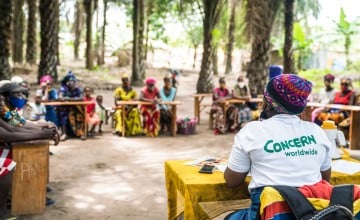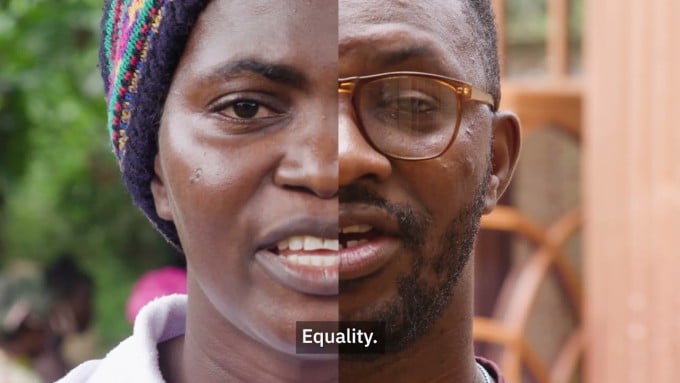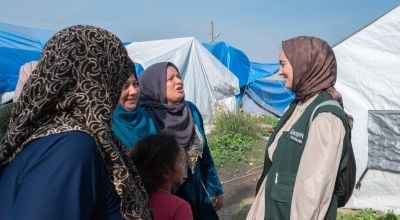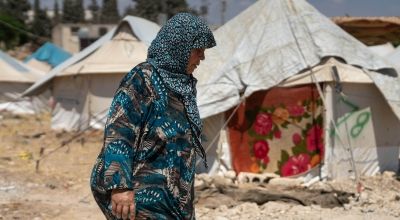
Read our 2024 annual report

Knowledge Hub
Preventing gender-based violence (GBV) is a complex task. There are many drivers of it, and at different levels.
Worldwide, an estimated 840 million women have been subjected to physical and/or sexual intimate partner violence, non-partner sexual violence, or both, at least once in their life - that's almost one in three women. While violence affects women in all countries and contexts, women and girls in low-income, conflict-affected, and climate-vulnerable settings are disproportionately affected by gender-based violence.
The stresses of poverty, the aftermath of a crisis, or the consumption of alcohol are just three very different examples of situations that can exacerbate violence. Looking deeper, however, factors such as patriarchal systems and attitudes and the harmful gender norms and attitudes that they cultivate, lie at the root of the problem.
As the 16 Days of Activism Against Gender-Based Violence begin, we are highlighting how Concern has been working to address such attitudes through a global partnership with Sonke Gender Justice.

Since 2017, Concern has been working with the South African NGO Sonke Gender Justice to shift harmful attitudes around gender and GBV, and the end of 2025 marks the end of eight incredible years working together.
Sonke are experts in facilitating gender transformative dialogue. That is, an experiential exploration of deeply held beliefs, biases and attitudes towards gender, and an opportunity to identify what needs to change. They ask questions like, “What does it mean to ‘be a man’?”, “Do you treat anyone in your life like a ‘thing’ rather than a person?” and, “How can we break the cycle of violence in our homes and communities?”
The approach addresses topics such as gender norms, power and decision making, before building up to more sensitive topics specifically about violence. They also place a large focus on healthy communication and encourage people to become active in the prevention of GBV in their communities.
A team of dedicated trainers from Sonke have spent a lot of time on the road, travelling to a total of 18 countries, often multiple times, and held gender transformative workshops with approximately 2158 Concern staff and partners (1262 men and 896 women).
These staff reflect on their own attitudes in the workplace and at home, and then many go on to learn to be facilitators themselves. Thanks to the preparation that Sonke have provided, they facilitate such sessions in the communities, as part of livelihoods, health or education projects.
The gender transformative dialogue sessions have been held with women starting up their own businesses along with their husbands in Malawi, teachers and health workers in Sierra Leone, and fathers of infants and young children in Ethiopia and Somalia, to name just a few.
For example, the Breaking the Barriers Manual has been adapted in Sierra Leone specifically for use with healthcare workers, in support of the programme’s objectives.
A female Concern staff member shared some of the positive feedback they had received from government partners who had been through the Sonke training: “Some of them were saying it’s the first of its kind. There was some gender training they had received, but it was not like this. This training makes people reflect, and it is safe to share. It was really, really helpful.
"It helped them to identify some of the things that were normal for them to do, especially when it comes to power, and there was a lot of testimony that came out about how they’ve been using ‘power over’ – not knowing and believing this was normal.”
Our children will grow up with these habits and they won’t make the same mistakes.
One of our programme participants from Malawi shared: “We used to argue a lot. Before, everything I did made my husband angry. But now those problems are gone. Now we do things together… We are really building a life together.” Her husband added: “Because of what I learned, I’ve stopped using violence with my wife. Now my family has freedom. Our children will grow up with these habits and they won’t make the same mistakes. They will see how to have harmony in the family.”
These kinds of results are what this partnership is all about. Increasing harmony at home means households can better meet their needs and move out of extreme poverty, women having more voice in the home and in the community means their needs are represented.
The value of collaboration
Sonke’s Regional Specialist, Nkonzo J Khanyile, who has led the partnership from the very beginning, reflected: “The real achievement of this eight-year partnership isn’t just the number of people trained, but how gender transformative principles, I believe, are now shaping systems, leadership, and everyday practice across Concern Worldwide. What stands out most for me is how this collaboration has created spaces for honest reflection aimed at helping staff look at their own beliefs and behaviours in new ways. And how those conversations, insights, and personal shifts have strengthened both the programmes and the people who deliver them, contributing to long-lasting change.
"The learning has gone both ways. For Sonke Gender Justice, this partnership has broadened our reach, deepened our technical practice, and strengthened our understanding of what gender transformation looks like across different countries, contexts and sectors. It has truly been a shared journey of growth, learning, and commitment to more equitable and inclusive communities.”
Gender equality remains essential to how Concern designs its programmes and so Sonke’s support will not be far away. But over these eight years working closely together, they have strengthened capacity in our staff and partners to be able to continue implementing such critical dialogue within our programmes. They have propelled us forward in order to be able to tackle GBV at the root.






